Medial anterior prefrontal cortex stimulation downregulates implicit reactions to threats and prevents the return of fear
- PMID: 38913410
- PMCID: PMC11196108
- DOI: 10.7554/eLife.85951
Medial anterior prefrontal cortex stimulation downregulates implicit reactions to threats and prevents the return of fear
Abstract
Downregulating emotional overreactions toward threats is fundamental for developing treatments for anxiety and post-traumatic disorders. The prefrontal cortex (PFC) is critical for top-down modulatory processes, and despite previous studies adopting repetitive transcranial magnetic stimulation (rTMS) over this region provided encouraging results in enhancing extinction, no studies have hitherto explored the effects of stimulating the medial anterior PFC (aPFC, encompassing the Brodmann area 10) on threat memory and generalization. Here we showed that rTMS over the aPFC applied before threat memory retrieval immediately decreases implicit reactions to learned and novel stimuli in humans. These effects enduringly persisted 1 week later in the absence of rTMS. No effects were detected on explicit recognition. Critically, rTMS over the aPFC resulted in a more pronounced reduction of defensive responses compared to rTMS targeting the dorsolateral PFC. These findings reveal a previously unexplored prefrontal region, the modulation of which can efficiently and durably inhibit implicit reactions to learned threats. This represents a significant advancement toward the long-term deactivation of exaggerated responses to threats.
Keywords: TMS; anterior prefrontal cortex; dorsolateral prefrontal cortex; human; neuroscience; threat generalization; threat memory; transcranial magnetic stimulation.
© 2024, Manassero, Concina et al.
Conflict of interest statement
EM, GC, MC, PS, AS, RR, BS No competing interests declared
Figures
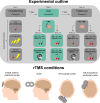
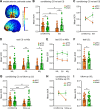
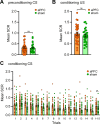

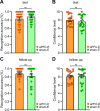
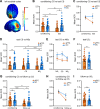
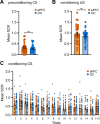
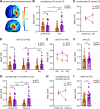
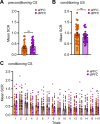
Update of
- doi: 10.1101/2023.02.06.527256
Similar articles
-
State-Dependent TMS over Prefrontal Cortex Disrupts Fear-Memory Reconsolidation and Prevents the Return of Fear.Curr Biol. 2020 Sep 21;30(18):3672-3679.e4. doi: 10.1016/j.cub.2020.06.091. Epub 2020 Jul 30. Curr Biol. 2020. PMID: 32735813
-
'Nip it in the bud': Low-frequency rTMS of the prefrontal cortex disrupts threat memory consolidation in humans.Behav Res Ther. 2024 Jul;178:104548. doi: 10.1016/j.brat.2024.104548. Epub 2024 Apr 27. Behav Res Ther. 2024. PMID: 38704974
-
Extinction during reconsolidation of threat memory diminishes prefrontal cortex involvement.Proc Natl Acad Sci U S A. 2013 Dec 10;110(50):20040-5. doi: 10.1073/pnas.1320322110. Epub 2013 Nov 25. Proc Natl Acad Sci U S A. 2013. PMID: 24277809 Free PMC article.
-
Neuroimaging and neuromodulation approaches to study eating behavior and prevent and treat eating disorders and obesity.Neuroimage Clin. 2015 Mar 24;8:1-31. doi: 10.1016/j.nicl.2015.03.016. eCollection 2015. Neuroimage Clin. 2015. PMID: 26110109 Free PMC article. Review.
-
Transcranial magnetic stimulation and transcranial direct current stimulation affect explicit but not implicit emotion regulation: a meta-analysis.Behav Brain Funct. 2023 Sep 19;19(1):15. doi: 10.1186/s12993-023-00217-8. Behav Brain Funct. 2023. PMID: 37726856 Free PMC article. Review.
Cited by
-
Examining anterior prefrontal cortex resting-state functional connectivity patterns associated with depressive symptoms in chronic moderate-to-severe traumatic brain injury.Front Neurol. 2025 Mar 28;16:1541520. doi: 10.3389/fneur.2025.1541520. eCollection 2025. Front Neurol. 2025. PMID: 40224311 Free PMC article.
-
An intracranial dissection of human escape circuits.Nat Commun. 2025 Jul 1;16(1):5520. doi: 10.1038/s41467-025-60666-9. Nat Commun. 2025. PMID: 40595515 Free PMC article.
-
Subregions in the ventromedial prefrontal cortex integrate threat and protective information to meta-represent safety.PLoS Biol. 2025 Jan 13;23(1):e3002986. doi: 10.1371/journal.pbio.3002986. eCollection 2025 Jan. PLoS Biol. 2025. PMID: 39804855 Free PMC article.
-
Overgeneralization of autonomic defensive reactions in obesity.Sci Rep. 2024 Oct 9;14(1):23562. doi: 10.1038/s41598-024-72439-3. Sci Rep. 2024. PMID: 39384611 Free PMC article.
-
Adaptive Safety Coding in the Prefrontal Cortex.bioRxiv [Preprint]. 2024 Jul 23:2024.07.19.604228. doi: 10.1101/2024.07.19.604228. bioRxiv. 2024. PMID: 39091862 Free PMC article. Preprint.
References
-
- Ameli R, Ip C, Grillon C. Contextual fear-potentiated startle conditioning in humans: replication and extension. Psychophysiology. 2001;38:383–390. - PubMed
MeSH terms
Grants and funding
LinkOut - more resources
Full Text Sources
Miscellaneous

